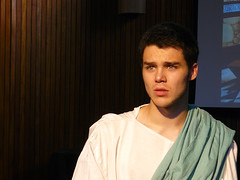Review – Julius Caesar
* * *
 By Thom Dibdin
By Thom Dibdin
George Watson’s College
George Watson’s S6 Drama course have created a clear and, ultimately, powerful production of Shakespeare’s great tragedy of the end Julius Caesar’s reign.
Director Alfonso Iannone has had no truck with modernity for the staging. This is period Rome, complete with flashy breastplates and red-plumed helmets. And with a 35 strong cast at his disposal, there is plenty of scope for pounding troops to indicate the generals’ power as they manoeuvre against each other in the final scenes.
No parable for modern times, then. There are no parallels here to be drawn with the Gaddafis and Berlusconis of our age. It is simply the history, eloquently set-up with projections telling the facts of Caesar’s long rise to power before he crossed the Rubicon for Rome in 49BC, for those who aren’t quite up to speed with their classics.
Such an approach does no favours for the opening scenes, however. Fiona MacDonald and Matt Rodger as the tribunes Flavius and Marullus have their work cut out in the light-hearted comedy scene that sets the whole play up.
The difficulty lies in getting the language right. There’s no need to rush at it, as the banter between Marullus and the cobbler commoner illustrates. Becky Collins’ cobbler isn’t really given a chance to get her tongue around the tasty wordplay that, in equating soles with souls, hints at the true nature of the tragedy which is to come.
So there is no sense of progression as the two tribunes berate the vulgar crowds for taking to the streets to applaud Caesar where they had previously cheered the general Pompey – now vanquished by his previous ally Caesar.
The opening is lightly done, however, and such a lightness of tone continues with the arrival of main characters on into the first unfurling of the conspiracy to murder Caesar.
Here, Caitlin French is a brilliant Cassius, the main collaborator in Caesar’s downfall. She’s a real snake-in-the-grass, manoeuvring Jack Cameron’s upright Brutus with ease and setting out in the clearest of terms why he is the pivotal element. Behind them, the cohort of conspirators all keep it clear, led by Kirsty Shaw as Casca and Laura Cruickshank as Cicero.
Against them, Chris Trew’s Julius Caesar is the sort of man who you would follow into battle. None of the weaknesses alluded to in the text are obvious in this conquering hero who has returned to Rome to claim his rightful place at the head of the Roman empire.
His right-hand man, Mark Antony, is given an understated presence by James Davidson. He depicts a character who is completely in control, with little hint of the canny operator who will appear on Caesar’s death.
What shines through is a strong understanding of the power-politics of the play. Once the knives are out – and Caesar received his three and thirty cuts to die with the infamous cry “Et tu, Brute” – it really takes off.
With French prowling about as the malignant Cassius, Davidson’s Mark Antony is let loose to turn the tables on the conspirators in general and Cameron’s still honourable Brutus in particular. The oratory scene at the funeral of Caesar is particularly excellent, with the crowd mingling in with the audience, they are swayed by the calculating rhetoric of Cameron and Davidson.
As history and as a lesson in retribution this is powerfully played. The simple stage design is made a virtue of while the projections help tell of the power of the empire in question – and the enormity of the battles which ensue.
There are niggles, however. Notably a tendency – and this goes right through the production – to deliver the blank verse line for line. At best it doesn’t sound natural or trip off the tongue. At worst, it miss-places the accent and makes the actors appear as if they don’t understand what they are saying.
That said, this is a thoroughly satisfying reading of the play which allows its audience, as all productions should, to find new meanings in the familiar text.
Run ends Thursday 29 September
ENDS




















